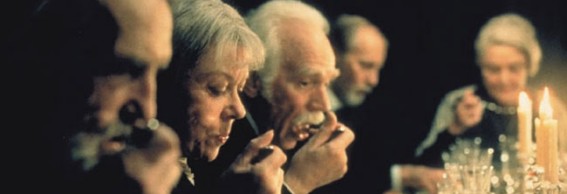Ready for a relaxing break from work that you can still chalk up to academic edification? Never fear: the Theology Workshop & Club warmly invite you to a social gathering and movie night, with a film that contributes to this quarter’s investigation of “Embodiment, Sexuality, and Religion,” with plenty of delicious food and drink to accompany it.
“Babette’s Feast” & DSA Social (guests welcome!) Saturday, February 9 6:00 PM Brent House (5540 S. Woodlawn)Come for the food, brews, & classic film; stay if you choose for some casual conversation on the religious significance of Eating, Drinking, Embodiment, & Whatnot in the company of your fellows who are regularly involved in all four.

Babette’s Feast:
The elderly and pious Christian sisters Martine and Philippa live in a small village on the remote western coast of 19th-century Denmark. Their father was a pastor who founded his own Christian sect. With their father now dead, and the sect drawing no new converts, the aging sisters preside over their dwindling congregation of white-haired believers. But all will change when Babette Hersant, a refugee from counter-revolutionary bloodshed in Paris, appears at their door. The sisters take Babette in, and she serves as their maid and cook for the next fourteen years. Her only link to her former life is a lottery ticket that a friend in Paris renews for her every year. One day, she wins the lottery of 10,000 francs. Instead of using the money to return to Paris and her lost lifestyle, she decides to spend it preparing a magnificent dinner for the sisters and their small congregation. More than just a feast, the meal is an outpouring of Babette’s appreciation, an act of self-sacrifice; Babette tells no one that she is spending her entire winnings on the meal.
As the various never-before-seen ingredients arrive, and preparations commence, the sisters begin to worry that the meal will become a great sin of sensual luxury, if not some form of devilry. In a hasty conference, the sisters and the congregation agree to eat the meal, but to forego speaking of any pleasure in it, and to make no mention of the food during the entire dinner. Although at first they refuse to comment on the earthly pleasures of their meal, Babette’s gifts begin to break down their distrust. Old wrongs are forgotten, lost loves are rekindled, and human carnality and spirituality are themselves reconciled at the table.
